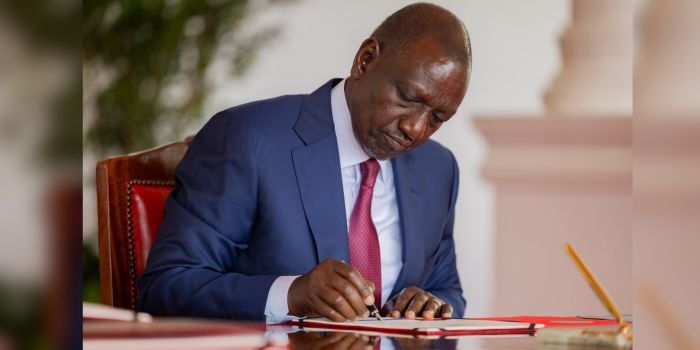Pressure Mounts on Ruto to Withdraw Cyber Crime Law as Protests Loom
President William Ruto is facing growing pressure to repeal the Computer Misuse and Cybercrimes (Amendment) Act 2024, a law he signed on the same day former Prime Minister Raila Odinga passed away.
Many Kenyans and legal experts believe the law was rushed and could be used to limit freedom of expression online.
On Monday, October 20, lawyer Miguna Miguna questioned through an X post whether President Ruto would reconsider the controversial law amid reports that it has sparked renewed calls for anti-government demonstrations.
Miguna’s remarks added to the widespread criticism of the law, which was signed together with seven other contentious Bills, all of which have drawn sharp scrutiny from the public and civil society.
The timing of the signing — coinciding with the announcement of Raila’s death — raised eyebrows, with many Kenyans accusing the government of trying to sneak in the legislation when the nation was mourning. “Will William Ruto recall the Cyber Crime Act and other offensive laws he signed before announcing Raila Odinga’s death, or is he determined to push Kenyans back to the streets?” Miguna asked.
Critics argue that the Cybercrimes (Amendment) Act seems less focused on combating actual cyber threats and more aimed at strengthening government control over digital spaces.
The law grants the government sweeping powers to block websites, remove online content, or shut down apps and social media platforms, raising fears it could be weaponized to silence dissent, restrict investigative journalism, and suppress legitimate online debate.
Analysts have also raised concerns over the vague language used in the law. Terms such as “likely to cause fear or violence,” “grossly offensive,” “promote illegal activities,” and “extremist religious or cultic practices” are seen as ambiguous and open to broad interpretation.
This ambiguity, they warn, gives the government excessive discretion in deciding what content is deemed illegal or dangerous.
Moreover, the penalties outlined in the law are considered too harsh and disproportionate. Many human rights groups argue that they reflect a retreat from Kenya’s commitment to digital freedom and fair justice.
For instance, the offense of cyber harassment — which is defined as communication that may cause emotional distress, harm to reputation, safety, or property — carries a fine of up to Ksh20 million, a 10-year prison sentence, or both.
In addition to the cyber law, President Ruto also assented to seven other pieces of legislation on October 15.
These include the Privatisation Bill (2025), National Land Commission (Amendment) Bill 2023, Land (Amendment) Bill 2024, Virtual Asset Service Providers Bill 2025, Air Passenger Service Charge (Amendment) Bill 2025, Wildlife Conservation and Management (Amendment) Bill 2024, and the National Police Service Commission (Amendment) Bill 2024.
Each of these new laws has also attracted public debate and scrutiny regarding their potential implications for governance, transparency, and citizens’ rights.
Meanwhile, Miguna Miguna further questioned the government’s accountability following reports that several mourners lost their lives during the public viewing of Raila Odinga’s body at Kasarani Stadium. He demanded answers on who was responsible for the chaos and whether justice would be served.
Raila Odinga, who died at the age of 80 after suffering a cardiac arrest in India while seeking treatment, was accorded a State Funeral with full military honours. President Ruto declared seven days of national mourning in his honour.
However, the period of mourning was overshadowed by disturbing scenes at Kasarani, where police clashed with large crowds of mourners who had come to pay their last respects. Tear gas and gunfire were reported, leaving several people injured and sparking outrage among Raila’s supporters.
The long-time opposition leader was finally laid to rest on Sunday, October 19, at Kang’o ka Jaramogi in Siaya County, just a few metres from the mausoleum of his father, the late Jaramogi Oginga Odinga.
As calls for nationwide protests grow louder, pressure continues to mount on President Ruto to recall or amend the Cybercrime law.
Many Kenyans view it as a step backward for democracy and digital rights, warning that unless the government takes action, the country could soon witness another wave of public unrest.
Join Government Official WhatsApp Channel To Stay Updated On time
https://whatsapp.com/channel/0029VaWT5gSGufImU8R0DO30


